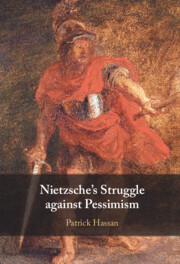Nietzsche's Struggle against Pessimism
- Author: Patrick Hassan, Cardiff University
- Date Published: November 2023
- availability: Available
- format: Hardback
- isbn: 9781009380270
Hardback
Other available formats:
eBook
Looking for an inspection copy?
This title is not currently available on inspection
-
On what grounds could life be made worth living, given its abundant suffering? Friedrich Nietzsche was among many who attempted to answer this question. While always seeking to resist pessimism, Nietzsche's strategy for doing so, and the extent to which he was willing to concede conceptual grounds to pessimists, shifted dramatically over time. His reading of pessimists such as Eduard von Hartmann, Olga Plümacher, and Julius Bahnsen—as well as their critics, such as Eugen Dühring and James Sully—has been under-explored in the secondary literature, isolating him from his intellectual context. Patrick Hassan's book seeks to correct this. After closely mapping Nietzsche's philosophical development on to the relevant axiological and epistemological issues, it disentangles his various critiques of pessimism, elucidating how familiar Nietzschean themes (e.g. eternal recurrence, aesthetic justification, will to power, and his critique of Christianity) can and should be assessed against this philosophical backdrop.
Read more- Offers a wider account of Nietzsche's intellectual context for his articulation, and critique, of pessimism
- Disentangles Nietzsche's seemingly scattered remarks about pessimism into clearly delineated critiques
- Contains in-depth analysis of key passages in Nietzsche's corpus
Reviews & endorsements
'In place of a superficial acceptance or rejection, Patrick Hassan nuances in a fruitful and quite original way Nietzsche's critical engagement with the varieties and historical iterations of pessimism. A rare combination of historical erudition and analytic precision, this is an essential book on a core topic in Nietzsche studies.' Anthony Jensen, Providence College
See more reviews'Nietzsche's critique of pessimism has often been framed as a response to Schopenhauer. Hassan usefully expounds the wider intellectual context and shows philosophical sensitivity in reconstructing the thought of the now-lesser-known figures that Nietzsche was in dialogue with, beyond just Schopenhauer.' Andrew Huddleston, University of Warwick
Customer reviews
Not yet reviewed
Be the first to review
Review was not posted due to profanity
×Product details
- Date Published: November 2023
- format: Hardback
- isbn: 9781009380270
- length: 284 pages
- dimensions: 235 x 158 x 21 mm
- weight: 0.57kg
- availability: Available
Table of Contents
Introduction
Part I. Nietzsche's Intellectual Context & Early Reception of Pessimism:
1. The varieties of pessimism
2. Nietzsche's initial engagement with pessimism
Part II. The Beginnings of Change: Pessimism in Human All Too Human:
3. Nietzsche's new naturalism
4. 'Bad news for priests': scientific progress and suffering
Part III. Nietzsche's mature rejection of the 'Pessimism of Sensibility':
5. A psychological critique
6. An existential critique
7. A perfectionist critique
Conclusion
Bibliography
Index.
Sorry, this resource is locked
Please register or sign in to request access. If you are having problems accessing these resources please email [email protected]
Register Sign in» Proceed
You are now leaving the Cambridge University Press website. Your eBook purchase and download will be completed by our partner www.ebooks.com. Please see the permission section of the www.ebooks.com catalogue page for details of the print & copy limits on our eBooks.
Continue ×Are you sure you want to delete your account?
This cannot be undone.
Thank you for your feedback which will help us improve our service.
If you requested a response, we will make sure to get back to you shortly.
×





